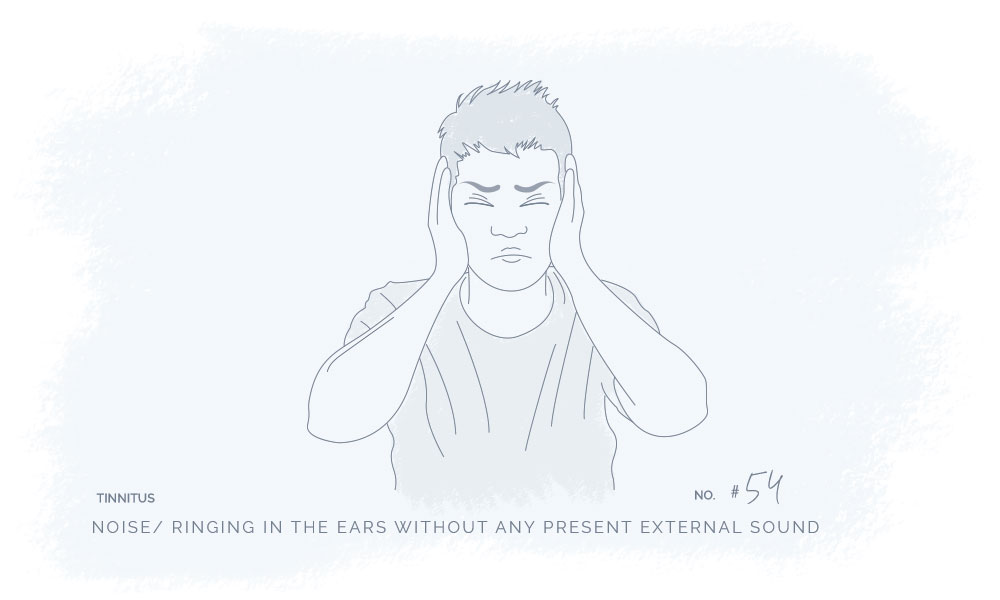20
Tinnitus
Category
Eye/ear diseases & symptoms
REVIEWED BY
Our Biomedical Scientist
Reviewed based on
Literature Review
Last update
December 2020

What is Tinnitus
Tinnitus is the perception of noise and/or ringing in the ears, when no external sound is present, caused by a symptom of an underlying condition. Tinnitus can be improved with treatment and is typically not a sign of any severe health issues.1
Symptoms
People with tinnitus can experience these types of phantom noises in the ears:
- Buzzing
- Roaring
- Clicking
- Hissing
- Humming
Tinnitus can vary in volume and frequency and depending on the severity it may interfere with the ability to concentrate or hear external sound(s).
Cause
There are two existing types of Tinnitus:
- Subjective tinnitus Only patients can hear it. The cause of this type of tinnitus could be due to the problems in the outer, middle, or inner ear and problems with the auditory nerves. Another reason for this type of tinnitus could be that a part of the brain interprets nerve signals as sound.
- Objective tinnitus
Doctors can hear it when they examine patients. It is an uncommon type of tinnitus and this could be due to blood vessel problems, middle ear bone condition, or muscle contractions.
The symptoms are often caused by an ear injury, age-related hearing loss, ear hair cell damage, and/or a circulatory system disorder. However, other ear problems, chronic health conditions, ear injuries, or conditions affecting the nerves in the ear or the brain’s hearing center may cause tinnitus as well.1
The connection between Cannabinoids & Tinnitus
Studies find that CBD and THC may have great therapeutic potential and may be used to help treat Tinnitus. CBD and THC are well-known cannabinoids, however, they do not have the same psychoactive effects. THC is psychoactive while CBD does not possess psychoactive effects. According to WHO guidelines, the cannabidiol CBD is generally well tolerated with a good safety profile.
Preclinical data proposes that THC and CBD may be used in the therapeutic treatment of tinnitus, as the endocannabinoid system can be involved in the development of tinnitus via the cannabinoid receptor CB1 and the endocannabinoid 2AG.
THC and CBD can help regulate tinnitus symptoms but to this date, the specific mechanism of cannabinoids remains to be elucidated. 2
The literature discussion is an overview of the published results from scientific studies investigating if and how cannabinoids can be beneficial in the treatment of tinnitus. The overview will be updated regularly to ensure the newest and most accurate information.
The ECS, cannabinoid receptors, and endocannabinoids may be beneficial in the treatment of tinnitus
CB1 receptors and 2AG are present in the auditory brainstem.3
The endocannabinoid system may be involved in multisensory integration in the brain.4
In rats, a decreased number of CB1 receptors in the ventral cochlear nucleus could be associated with tinnitus development.5
It is proposed that tinnitus is a form of sensory epilepsy and that cannabinoid receptor agonists may exhibit anti-epileptic activities.6
Clinical trials are research studies that examine new treatments and evaluate their effects on human health outcomes.
Today, we are not able to provide any clinical trials about cannabinoids and tinnitus.
- https://www.mayoclinic.org/diseases-conditions/tinnitus/symptoms-causes/syc-20350156
- https://ghmedical.com/endocannabinoid-system/diseases/tinnitus
- Zhao, Y., Et Al., (2009). “Distinct functional and anatomical architecture of the endocannabinoid system in the auditory brainstem”. https://pubmed.ncbi.nlm.nih.gov/19279154/
- Zhao, Y., Et Al., (2011). “Mechanisms underlying input-specific expression of endocannabinoid-mediated synaptic plasticity in the dorsal cochlear nucleus”. https://pubmed.ncbi.nlm.nih.gov/21426926/
- Zheng, Y., Et Al., (2007). “Cannabinoid receptor down-regulation in the ventral cochlear nucleus in a salicylate model of tinnitus”. https://pubmed.ncbi.nlm.nih.gov/17376618/
- Zheng, Y., Et Al., (2015). “Cannabinoid CB1 receptor agonists do not decrease, but may increase acoustic trauma-induced tinnitus in rats”. https://www.frontiersin.org/articles/10.3389/fneur.2015.00060/full
CANNABINOIDS & RECEPTORS
Below you find the plant cannabinoids, cannabinoid receptors, and endocannabinoids that are associated with the potential therapy.
If you have any further information relevant to the connection between tinnitus and cannabinoids or find any of the information inaccurate, outdated or incomplete please contact us here.

